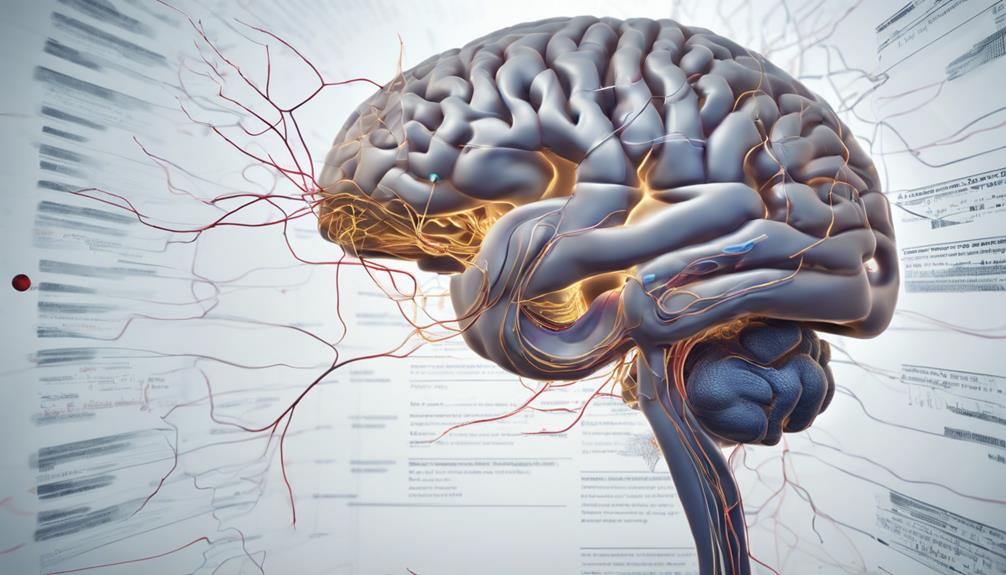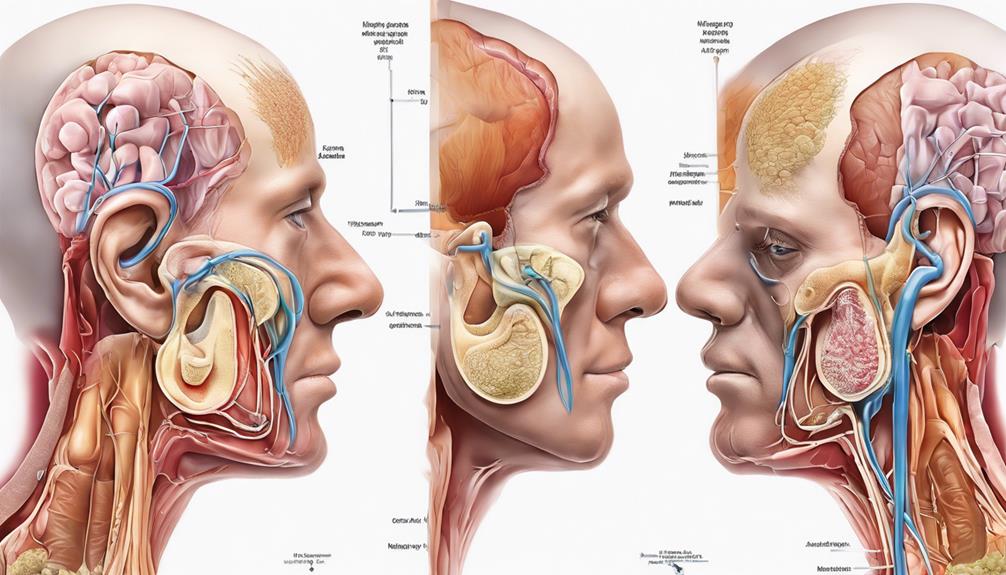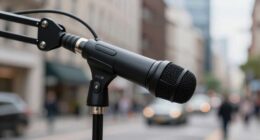In this conversation, we explore the connections between COVID-19 and hearing loss, uncovering subtle yet significant correlations.
As we unravel the intricate relationship between the virus and auditory function, we unearth compelling insights that shed light on the potential long-term repercussions for individuals affected by COVID-19.
Stay tuned to discover the key findings that could reshape our understanding of this intriguing intersection between a global health crisis and a sensory domain so vital yet often overlooked.
Key Takeaways
- COVID-19 damages inner ear components, leading to sensorineural hearing loss.
- Long COVID may result in persistent auditory complications, including new-onset issues.
- Treatment options for COVID-induced hearing loss include steroids and antiviral medications.
- Potential link between COVID vaccines and hearing issues, like tinnitus, necessitates monitoring and research.
Mechanisms of COVID-related Hearing Loss
Through various mechanisms, COVID-19 can lead to damage in crucial components of the inner ear, resulting in potential hearing loss. The virus is capable of affecting the organ of Corti, spiral ganglia, and stria vascularis within the inner ear, which are essential for auditory function. This damage can manifest as sensorineural hearing loss, where the nerves responsible for transmitting sound signals to the brain are impacted.
The cochlear nerve, vital for auditory processing, can also suffer harm due to COVID-19-related inflammation, further contributing to hearing issues. Additionally, research has shown that the virus has the ability to infect cells in the inner ear directly, causing various auditory complications. These intricate interactions between COVID-19 and the inner ear structures highlight the complexity of how the virus can disrupt the delicate mechanisms involved in hearing, potentially leading to significant challenges in auditory perception and processing.
Impact of Long COVID on Hearing

The lingering effects of COVID-19, particularly in individuals experiencing long COVID, can significantly impact hearing function. Studies indicate a potential link between the virus and lasting auditory complications. Research suggests that a percentage of those with long COVID may endure hearing loss persisting for months post-acute phase recovery.
Long COVID, characterized by symptoms lasting three or more months post-recovery, may also manifest as new-onset hearing issues. COVID-19 has been shown to accelerate pre-existing hearing problems in individuals with long COVID. While tinnitus appears to be more prevalent than hearing loss in this group, the varied auditory symptoms underscore the impact of long COVID on hearing health.
Understanding these implications is paramount for providing appropriate treatment and support to those experiencing persistent auditory symptoms. Further research is essential to elucidate the mechanisms underlying these effects and to develop effective interventions for individuals battling long COVID-related hearing challenges.
Treatment Options for COVID-induced Hearing Loss
Steroids may be utilized as a treatment option for COVID-induced hearing loss to reduce inflammation in the inner ear. Combining antiviral medications with corticosteroids has shown increased effectiveness in managing COVID-related hearing issues. Seeking prompt evaluation from an ear, nose, and throat doctor is crucial for enhancing recovery prospects from virus-associated hearing loss. Referral to otologic and audiologic services is essential to accurately assess the type and severity of the auditory disorder, leading to tailored treatment strategies. Immediate medical attention following sudden hearing loss post-COVID is imperative to maximize the chances of recovery. By incorporating these interventions, individuals experiencing COVID-induced hearing loss can optimize their recovery outcomes and regain their auditory function effectively.
Treatment Options for COVID-induced Hearing Loss:
- Steroids and Inflammation: Steroids help reduce inflammation in the inner ear, alleviating symptoms of COVID-induced hearing loss.
- Combination Therapy: Antiviral medications combined with corticosteroids offer a more comprehensive approach to treating COVID-related auditory issues.
- Specialized Care: Consulting with an ear, nose, and throat doctor and receiving referrals for otologic and audiologic services are vital steps towards tailored treatment and improved recovery outcomes.
Potential Link Between COVID Vaccines and Hearing Issues

Exploring a potential correlation between COVID vaccines and hearing issues, particularly tinnitus, has garnered attention amidst over 12,000 self-reported cases post-vaccination. While the CDC hasn't officially linked tinnitus to COVID vaccines, the European Medicines Agency has identified it as a potential side effect.
A study revealed tinnitus in 0.038% of vaccine recipients, noting slightly higher rates compared to flu and pneumonia vaccines. Reports indicating a possible association between COVID vaccines and tinnitus symptoms have sparked concerns. Ongoing research is crucial to fully understand the relationship between COVID vaccines and hearing issues like tinnitus.
As the investigation continues, it's essential for healthcare providers to remain vigilant and consider monitoring hearing health in vaccine recipients. The evolving data necessitates a comprehensive approach to assess and address any potential auditory implications of COVID vaccination.
Future Research Directions for COVID and Hearing Loss
Our future research endeavors will prioritize evaluating the long-term impact of COVID-19 on inner ear structures such as the organ of Corti, stria vascularis, and spiral ganglia. To delve deeper into this area, we plan to:
- Utilize objective tests like otoacoustic emission and auditory brainstem evoked potentials to assess inner ear damage in individuals post-COVID-19. These assessments can provide quantitative data on the extent of inner ear abnormalities and aid in understanding the mechanisms underlying sensorineural hearing loss.
- Investigate the prevalence and severity of sensorineural hearing loss in younger individuals who've recovered from COVID-19. By focusing on this demographic, we aim to identify any potential age-related vulnerabilities to inner ear damage following SARS-CoV-2 infection and its implications for long-term auditory health.
- Establish a direct link between SARS-CoV-2 infection and auditory complications like hearing loss, tinnitus, and vertigo in post-COVID-19 patients. Understanding the association between viral infection and auditory symptoms is crucial for developing targeted interventions and management strategies for individuals experiencing post-COVID-19 auditory issues.
Frequently Asked Questions
How Does COVID Cause Hearing Loss?
When COVID-19 infects, it can harm inner ear structures, leading to hearing loss. The virus may trigger inflammation in the Eustachian tube, causing fluid buildup and affecting hearing.
Studies link COVID-19 to hearing loss and other auditory symptoms, hinting at inner ear damage. Despite anecdotes linking vaccination to issues like tinnitus, direct inner ear effects seem improbable.
Vascular impact from COVID-19 can damage inner ear blood vessels, contributing to auditory problems.
Can Covid Cause Inner Ear Problems?
Yes, COVID-19 can cause inner ear problems. The virus can infect the cochlear and vestibular hair cells, potentially leading to hearing loss and vestibular dysfunction.
It can also enter the ear through the Eustachian tube, causing direct damage to inner ear structures. Middle ear congestion from respiratory symptoms can result in fluid buildup affecting hearing.
Proper evaluation and treatment are necessary for COVID-19-related inner ear issues.
How Do You Treat Long Covid Tinnitus?
When treating long COVID tinnitus, a multidisciplinary approach may be necessary. Otolaryngologists, audiologists, and mental health professionals collaborate to develop tailored treatment plans.
Strategies like sound therapy, counseling, and cognitive behavioral therapy (CBT) are commonly employed. Hearing aids or maskers could be recommended to mask the tinnitus sound and enhance quality of life.
Addressing underlying stress, anxiety, or depression is crucial in managing long COVID-related tinnitus. Regular follow-up appointments ensure progress tracking and ongoing support.
How Long Does It Take to Regain Hearing After Ear Infection?
Regaining hearing after an ear infection can vary in time. Mild cases may clear up in a few days to weeks, while severe cases might take weeks to months for full recovery. Prompt treatment can speed up the process.
In some instances, hearing loss could be permanent, necessitating ongoing management. It's crucial to seek medical advice for proper evaluation and treatment based on individual circumstances.
Conclusion
In conclusion, understanding how COVID can cause hearing loss is crucial for prompt recognition and treatment. By exploring the mechanisms, impact of long COVID, treatment options, and potential vaccine links, we can better address virus-related auditory complications.
Moving forward, continued research is essential to unravel the intricate relationship between COVID-19 and hearing issues. Stay informed, stay vigilant, and together, we can navigate through these challenges with a clearer understanding and proactive approach.











